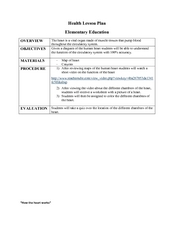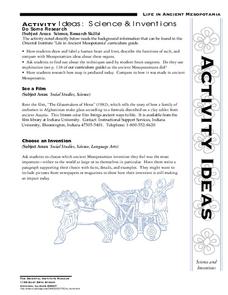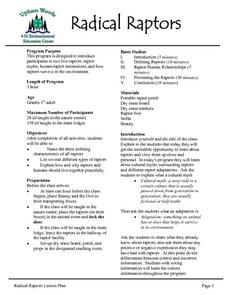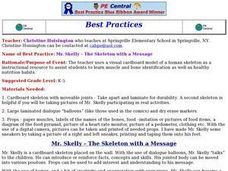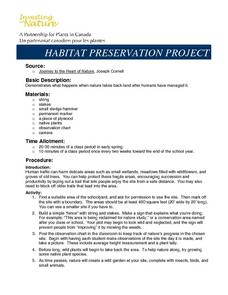Museum of Science
Virtual Heart
No more beating the pavement to find a virtual model of the human heart. See one in continual real-time motion, and layer it to highlight electrical impulses, blood flow, and valve activity.
Curated OER
You've Got to Have Heart
After reading an excellent description of the human heart, fifth graders look at a drawing of a human body, and choose the circle they think represents where the human heart is found. There are four circles inside the character's chest....
Curated OER
The Amazing Heart
Students examine human blood flow by comparing the pulse of athletes. In this human body lesson, students discover the equation for finding the cardiac output from a human heart. Students identify heart rates of accomplished athletes...
Curated OER
Can You Make a Muscle?
Why are muscles important? Third graders study the different kinds and functions of muscles in the human body. After drawing arrows in an illustration to indicate where a muscle contraction would occur, they do their own experiment about...
Curated OER
Bones Provide Great Support!
How do bones help people move around? A science investigation prompts kids to draw arrows to certain bones that protect their organs. After they finish, they trace their hands on a piece of paper and trace the way their bones go. Great...
Curated OER
Circulatory System
Don't let the first slide and its blurry picture detract you from the value of this PowerPoint. Yes, it needs new graphics, but the organization flows like blood, and it succinctly covers the structure and function of the circulatory...
Curated OER
What Happens to Our Hearts When We Are Active?
Students discover the benefits of a healthy heart through exercise. In this physical education instructional activity, students participate in a few physical activities in order to get their hearts beating faster. Students examine a...
Curated OER
Healthy Heart
Students explore how the heart works, examine pictures of a troubled heart, and discuss how to keep the heart healthy.
Curated OER
Human Body Parts
Students create body cutouts of themselves and label specific internal and external organs/parts that are covered in class in this exciting lesson on Human Anatomy. Digital cameras and pictures of various internal organs are required.
LABScI
Circulation and Respiration: Vital Signs
What do your vital signs tell your doctor? An engaging hands-on lesson has your learners monitor their own lung capacity, blood pressure, and heart rate. They then connect the vital measures to the workings of the circulatory and...
Curated OER
Bite on This!
Different types of teeth have different roles. Third graders study how molars, incisors, and canines function in a rabbit skull and a cat skull. After answering some questions about the teeth of herbivores and carnivores, kids...
Curated OER
Where Does the Blood Go?
Students investigate where the blood in our hearts travels by observing a diagram in class. In this cardiovascular lesson, students examine their own heart by checking their pulse in class. Students investigate a human body diagram and...
Curated OER
Heart Beating Exercise
Students examine video clips and websites that explore the heart. They find and take their pulse while at rest and after exercising. They discuss foods which are good and bad for heart health.
Curated OER
The Circulatory System
Students explore the circulatory system of animals. Using the Internet, students research animals without circulatory systems. They identify the three types of blood vessels and describe the flow of blood through the heart. Finally,...
Curated OER
Ya' Gotta Have Heart
Fourth graders study the parts of the human circulatory system and how they function. They design a flow chart of the circulatory system and use data to construct charts and graphs.
Curated OER
Circulatory System,
Fourth graders study the components and physiology of the human circulatory system.
Curated OER
The Strength of the Muscular System
Seventh graders investigate the strength of the muscular system. They explore voluntary and involuntary muscle movement and discuss the types of muscles: cardiac or heart, skeletal, and smooth. They visit stations to answer questions...
Curated OER
The Human Body
Students make life-size models of their bodies by having a partner trace them. They glue the basic body parts in the proper places and decorate them with hair, and facial features.
Curated OER
IDENTIFYING PARTS OF THE BODY
Students identify and describe the various parts of the body therefore, practicing English vocabulary, pronunciation, and spelling. They discuss the various body parts, some of the inner organs and also, their functions. Finally,...
Curated OER
Do Some Research
Sixth graders participate in various activities in which they must complete research. Individually, they draw a human heart and label each part along with its function. They use the internet to research an invention in Mesopotamia was...
Curated OER
Animals In Winter
Students read story Animals in Winter, and explore similarities and differences in how humans and other animals prepare for survival in winter. Students create class book that compares and illustrates different ways humans and animals...
Curated OER
Radical Raptors
Learners are introduced to raptors and their role in the environment. They identify three characteristics of raptors and list several types of raptors found in nature. They discuss their positive and negative experiences with raptors and...
Curated OER
Health: The Skeleton with a Message
Students identify human muscles and bones from a cardboard skeleton, named "Mr. Skelly." Using dialog balloons as props, the teacher holds up advice from Mr. Skelly, such as noting he drinks milk to keep his bones strong. The...
Curated OER
Habitat Preservation Project
Students demonstrate what happens when nature takes back land after humans have managed it. They find an area in the schoolyard, and mark it off with a boundary. Students build a simple fence with string and stakes. They put up a sign...

















